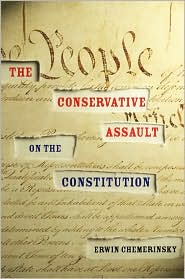On Thursday evening, I attended the Supreme Court Historical Society’s Frank C. Jones Reenactment Series Lecture. Justice Alito presided over a re-enactment of the famous British Debt case, Ware v. Hylton.
The evening began when Melvin Urofsky provided a cogent and entertaining overview of the facts of this case, which dealt with the repayment of debts incurred prior to the Revolutionary War to British creditors.
Justice Alito ascended to the bench, and placed himself back in time to 1796 when the case was originally argued (interestingly enough John Marshall argued that case, unsuccessfully, on behalf of the Virginia debtors).
At the time, there was no Chief Justice on the Court as Chief Justice Rutledge’s recess appointment expired, and he was not confirmed. Presiding on the Court were Justices Cushing, Patterson, Iredell, Wilson, and Chase. Justice Alito noted that his initial inclination was to play Justice Chase, as they both share the same first name–Samuel. However, because Justice Chase was later impeached by the house, Justice Alito sought to distance himself from that pick. Ultimately, Justice Alito assumed the role of his fellow Garden State judicial brethren, Justice William Patterson. It’s a Jersey Thing.
Justice Alito/Patterson surrounded himself on the bench with a semicircle of Green Bag Bobbleheads, including Justices Wilson, and Cushing, and the bobblehead of Chief Justice Jay to represent Justice Iredell, and the bobblehead of Justice Chief Justice Rutledge to represent Justice Chase.
Justice Alito heard zealous advocacy from opposing counsel, who assumed the roles of their 18th century predecessors at the Bar. The Rock Star of One First Street a/k/a the One-Justice Delta Force did not disappoint. Challenging his anachronistic assumptions of our federalist system under the Constitution, Justice Alito prodded counsel to consider the law as it existed under the Articles. Trying to ascertain whether a Treaty made under the auspices of the Articles of Confederation (specifically Article II) could abrogate a state law, and whether the Articles even delegated to the Congress the power to make such treaties, Justice Alito asked probing questions of both sides.
After arguments were delivered, Justice Alito conferred with his brethren (by rotating each bobblehead to face him, and whispering), and delivered a verdict. Much like the original Supreme Court in 1796, Justice Alito found that the debts were recoverable under the Treaty of Paris. Dissenting was Justice Iredell (Justice Alito gave the bobblehead a smack, so his head was shaking no).
After the event, Justice Alito graciously attended a reception at the Court. It was an excellent evening.

